It’s their right to feel they belong
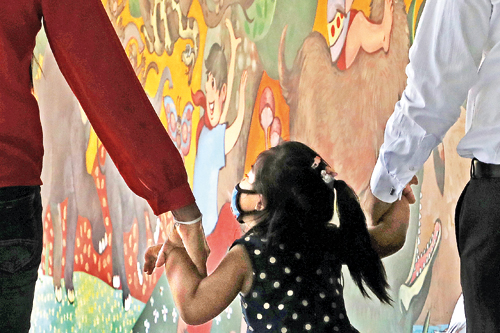
In the right direction: Initiative to give space and a voice to those with Down syndrome. Pix by M.A. Pushpa Kumara
A new social movement ‘Eka Se Salakamu’ is launched to empower children and families with Down syndrome at the country’s first National Centre for Children with Disabilities
Beautiful little girls in lovely dresses, smart little boys in nice suits and a festive air with bunches of balloons all in blue and yellow.
It is a celebration for all those families living amidst many challenges but also an important occasion to ‘Give a Voice’ to those living with Down syndrome, as the world marks a special day for them today (March 21).
The ‘Eka Se Salakamu’ programme to create a social movement to empower children and families with Down syndrome to live a dignified life, by the Hemas Outreach Foundation and ‘AYATI’, the country’s first National Centre for Children with Disabilities, Ragama, was launched on Wednesday. The occasion also benchmarked the AYATI Speech & Language Therapeutic Wing.
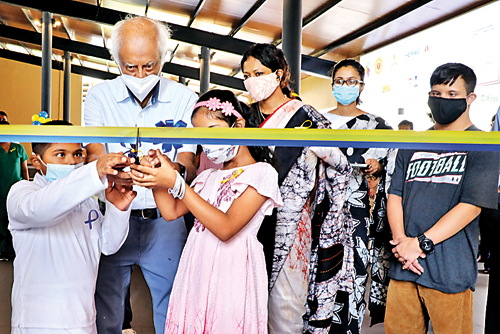
Two children open an art exhibition at AYATI for Prof. Harendra de Silva and Hemas CEO Kasturi Chellaraja Wilson
Before the poignant speeches, all eyes were on a riveting video – an elderly village woman passing by a neighbour sweeping her garden early morn, hearing, “Aney ammapa, adath ude pandara munata munichchi wechcha heti. Davasama ivarai. Munta gevalwalata wela inna beri heti (Oh, today too I had to see this face first thing in the morning. There goes my day. Can’t these people just stay at home)”…….Then the same woman putting out her hand for a bus, but the driver accelerating and passing her by.
Why, is the question that arises in the mind of the viewer as the agony of the elderly woman is felt and the camera pans in on the full image to reveal by her side, a boy with Down syndrome!
Then falls into context the association of Hemas Outreach Foundation and AYATI with those living with Down syndrome, as the Executive Director of the Foundation & AYATI Trust Sri Lanka, Shiromi Masakorala recalls a heartbreaking but defining moment.
It was 2006 and she was in Hambantota at a special school for children with disabilities set up under the Hemas’ ‘Piyawara Project’. Of the 47 children in that school, 34 were affected by Down syndrome and a mother had opened her heart out saying that she hoped against hope that her child would die at least one hour before she did as she was terrified of what fate awaited the child once she was no more.
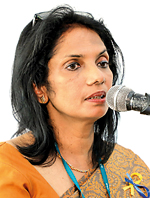
Shiromi Masakorala
“Usually, a parent wishes for her children to live a long life, even 100 years, but this is the tragic plight of these parents,” Shiromi tells the Sunday Times before the ceremony, in an emotional chat.
This was what paved the way for AYATI in collaboration with the Faculty of Medicine, University of Kelaniya in 2016, while Hemas has also set an example by employing people with Down syndrome, she says, decrying all including parliamentarians who insult each other by calling out names such as “manda buddhikaya” or “mongol”.
In 2018, MAS Holdings had joined hands to support AYATI.
Shiromi underscores that AYATI will champion the cause of eradicating stigma linked to disability, especially Down syndrome.
“People with Down syndrome are marginalized, laughed at, harassed and shunned. There are also many myths surrounding Down syndrome. The lives of parents, caregivers, siblings and the family unit are disrupted when a child with Down syndrome is born,” she says.
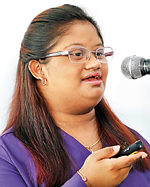
Nilshani de Silva
Pointing out that most parents are in denial when this happens and delay early intervention, Shiromi says that due to this, such children grow up in isolation and are “totally dependably disabled”. Most fathers leave the family or isolate them. These children also face sexual abuse.
“Even though Sri Lanka’s law provides for equal access to education for all, these children are not admitted to schools due to poor knowledge and myths. There are inadequate vocational training centres for them. They have lots of hidden talents, but stigma prevents them from making use of these,” she adds.
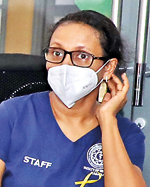
Prof. Samanmali Sumanasena
While there are no national statistics on the prevalence of Down syndrome in Sri Lanka, in countries such as America, 1 in 700 births is of a child with this condition. A study across three provinces in Sri Lanka on children with disabilities attending school, found that 39% were having Down syndrome. However, there is a lack of social support, especially for orphaned individuals living with Down syndrome, it is understood.
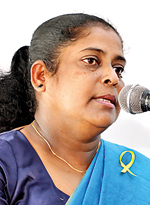
Champa Ovitigala
Many of the parents tell the Sunday Times similar tales. One mother speaks of how they have not told their in-laws about their 1½-year-old girl, while a father talks of how on finding out the sad truth, they decided with stoic resignation to do everything possible to bring up their little one, who is camera shy when we want to click some photos of her.
A mother, Champa Ovitigala, gives her story how she handled her daughter and how she was adamant that she should attend a normal school, while Nilshani de Silva living with Down syndrome goes before the mike to reveal her journey of reaching for the stars…..she is a teacher in the Special Education Unit of Bishop’s College.
A name that keeps cropping up, a stalwart who took up the cause of special children even before AYATI and is now very much a part of it is Prof. Samanmali Sumanasena, a Consultant Paediatrician.
Prof. Sumanasena’s message is that it is important for parents to accept a child with Down syndrome and work from the very early days by seeking the necessary services as it helps the child’s brain to grow.
“They also need to dream, like they would for any other child, about their future, while society and the education system need to provide strong support for them,” she adds.
While the Chief Guest at the function was Consultant Paediatrician Prof. Harendra de Silva, in the audience were Hemas Group CEO Kasturi Chellaraja Wilson; Colombo North (Ragama) Teaching Hospital Director Dr. S.P.A. Liyanage Ranaweera; Dean of the Ragama Medical Faculty Prof. Janaki De S. Hewavisenthi; and Sri Lanka Medical Association (SLMA) President Dr. Padma Gunaratne.
| Explaining the genetic disorder | |
| A genetic disorder by birth, Down syndrome is when, instead of inheriting 23 pairs of chromosomes each from the father and the mother, a baby gets a partial or full extra copy of Chromosome 21 from one of the parents. This causes abnormal characteristics, obstructing the natural mental and physical development of the baby.This disorder is named after the English physician John Langdon Down who described the characteristics of this condition. |
| Providing a platform for inclusivity and more | |
| The Eka Se Salakamu movement will provide a platform for these families and children to air their views, showcase their talents, share their experiences and lobby for their rights.It will facilitate the conducting of surveys and collection of data on Down syndrome in partnership with AYATI’s academic staff, introduce respite care and new programmes such as counselling and art and drama therapy for parents and lobby for state involvement in the setting up of a long-term care facility for orphaned Down syndrome people. While promoting inclusivity for these children in pre-schools and schools, the Eka Se Salakamu movement will also create links with AYATI-supported employment centres to open up opportunities for skilled Down syndrome personnel in the corporate sector.
|



